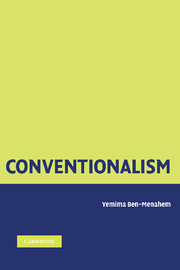Book contents
- Frontmatter
- Contents
- Preface
- 1 Overview: The Varieties of Conventionalism
- 2 Origins: Poincaré and Duhem on Convention
- 3 Relativity: From “Experience and Geometry” to “Geometry and Experience”
- 4 Implicit Definition
- 5 “Unlimited Possibilities”: Carnap on Convention
- 6 Metaphor and Argument: Quine on Convention
- 7 Wittgenstein: From Conventionalism to Iconoclasm
- References
- Index
7 - Wittgenstein: From Conventionalism to Iconoclasm
Published online by Cambridge University Press: 04 December 2009
- Frontmatter
- Contents
- Preface
- 1 Overview: The Varieties of Conventionalism
- 2 Origins: Poincaré and Duhem on Convention
- 3 Relativity: From “Experience and Geometry” to “Geometry and Experience”
- 4 Implicit Definition
- 5 “Unlimited Possibilities”: Carnap on Convention
- 6 Metaphor and Argument: Quine on Convention
- 7 Wittgenstein: From Conventionalism to Iconoclasm
- References
- Index
Summary
INTRODUCTION: THE PROBLEM
Whereas the philosophers discussed in previous chapters take a relatively unequivocal stand for or against certain conventionalist arguments, Wittgenstein's later philosophy is baffling: it seems both to explicitly affirm conventionalism, and persistently attack it. This tension is manifest, in particular, in Wittgenstein's critique of traditional notions of necessary truth, an issue as pivotal to Wittgenstein's own thought as it is to conventionalism. Hence in deciding whether Wittgenstein's later philosophy should be deemed a variant of conventionalism, the problem is not to determine whether or not his ideas on the nature of logical and mathematical truth fit a particular label or reflect the positions usually associated with conventionalism. The question, rather, is whether his ambivalent, if not conflicting, attitudes toward conventionalism can be reconciled.
Let me be more specific. In one of his lectures, Wittgenstein remarks: “One talks of mathematical discoveries. I shall try again and again to show that what is called a mathematical discovery had much better be called a mathematical invention” (1976, LFM, p. 22). This distinction between discovery and invention seems to imply a contrast between objective truths, over which we have no control, and those created via stipulation, which are up to us – that is, conventions. Further, the notion of grammatical rules, and that of rules constituting practices such as counting and measuring, which pervade Wittgenstein's later philosophy, also point to a conventionalist account of necessary truth.
- Type
- Chapter
- Information
- ConventionalismFrom Poincare to Quine, pp. 255 - 300Publisher: Cambridge University PressPrint publication year: 2006

